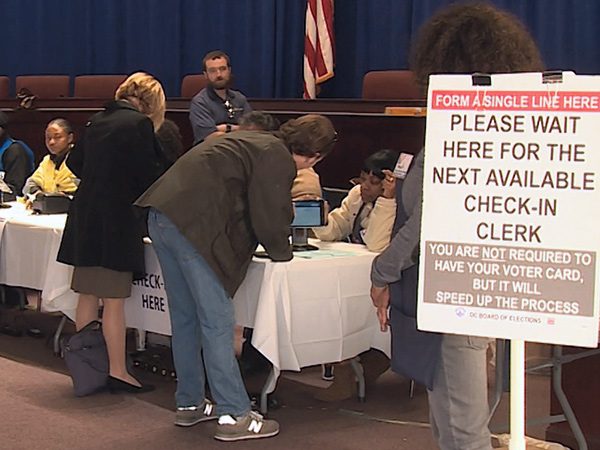 MAN #1: The presidential election? I probably won’t choose anybody.
MAN #1: The presidential election? I probably won’t choose anybody.
WOMAN #1: I think it’s pretty exhausting. I don’t really like either one of the candidates.
MAN #2: If we allow these things to divide us, we are in trouble.
MAN #3: It’s a little bit like a wreck. It’s fascinating, like a wreck, and you can’t take your eyes off of it, but it’s not inspiring that’s for sure.
WOMAN #2: Neither of these people represent me and what I stand for, and so I don’t want to do this because I feel like both of them are going to bring about negative changes in the democracy.
KIM LAWTON, correspondent: As voters go to the polls this year, in many quarters the mood is decidedly downbeat.
GREG SMITH, Pew Research Center: Voters overwhelmingly tell us that they’re having a negative reaction to the campaign.
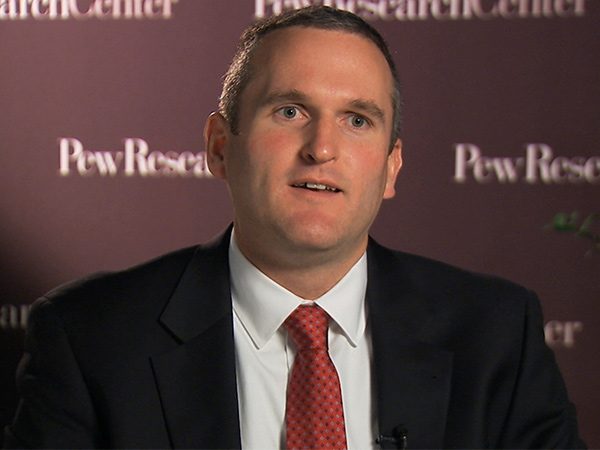 LAWTON: Greg Smith is associate director of research at the Pew Research Center, which has been polling voters throughout the pre-election season.
LAWTON: Greg Smith is associate director of research at the Pew Research Center, which has been polling voters throughout the pre-election season.
SMITH: Many of them say they’re disgusted by it, that they’re disappointed. That doesn’t necessarily mean they’re not engaged, in fact many of them are engaged, but by and large, people tell us they’re very unhappy with the state of this campaign.
LAWTON: Smith says the high levels of negativity can been seen in the nature of the support for the candidates.
SMITH: On both sides we’re seeing people tell us that the support for their candidate is driven as much by opposition to the other side. That’s not just true of Trump supporters, many of whom say that they are supporting Trump primarily as a matter of opposing Clinton. The same thing is true on the other side. There are many Clinton supporters who say that they’re supporting Clinton for president mainly as a matter of opposing Trump.
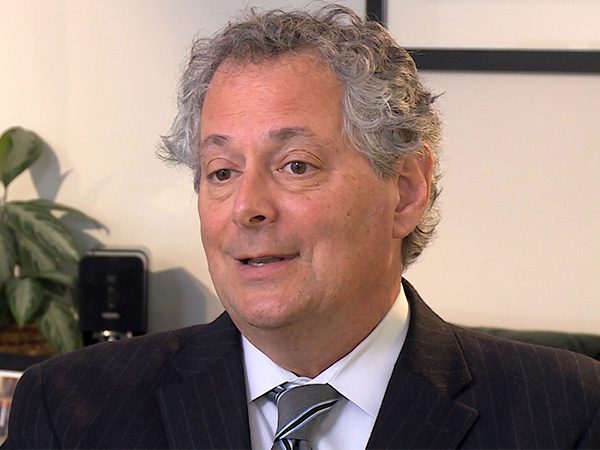 LAWTON: The negativity among voters often takes on a moral dimension. Many people of faith are among those raising concerns about the rhetoric that has dominated the campaign.
LAWTON: The negativity among voters often takes on a moral dimension. Many people of faith are among those raising concerns about the rhetoric that has dominated the campaign.
RABBI JACK MOLINE , Interfaith Alliance: We have fissures that have formed among the people that are being widened by this rhetoric and that are tearing us apart as a beloved community that we had tried to work for from the time of Dr. King.
PROF. STEPHEN SCHNECK, Catholic University of America: We should be talking about what we can do to make this a more moral world, about what we can achieve for our fellow human beings and you know instead it’s become ugly, vitriolic mudslinging, and it just breaks my heart as somebody who loves this republic.
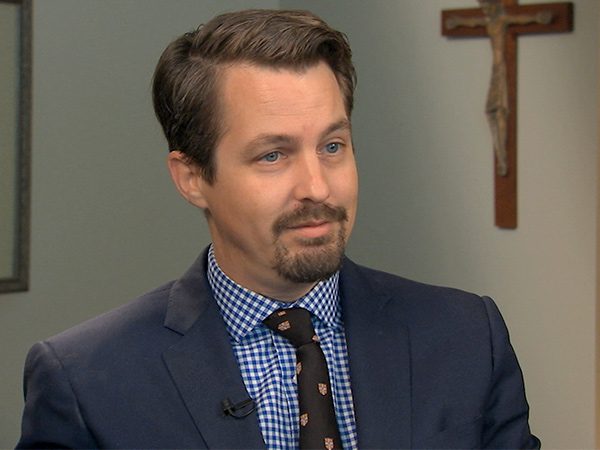 LAWTON: Some voters question whether they can in good conscience vote for either candidate. Chad Pecknold is professor of systematic theology at Catholic University of America. A pro-life Catholic, Pecknold tends to be politically conservative. This year, he says, he’s very conflicted.
LAWTON: Some voters question whether they can in good conscience vote for either candidate. Chad Pecknold is professor of systematic theology at Catholic University of America. A pro-life Catholic, Pecknold tends to be politically conservative. This year, he says, he’s very conflicted.
PROF. CHAD PECKNOLD, Catholic University of America: Donald Trump is such an abnormal candidate, is such a candidate of evident viciousness. That hasn’t inclined me to vote for Hillary Clinton because of her position on abortion.
LAWTON: So where does that leave you for November 8th?
PECKNOLD: It leaves me not voting for Hillary Clinton or Donald Trump. I don’t know where it leaves me in terms of whether or not I leave the top slot blank. It leaves me thinking that all my down-ticket choices have to be about advancing the common good and resisting the evils that I think could come from a corrupt executive.
LAWTON: Some voters are planning on voting for a third-party candidate. Others may write in another option. Many say they feel forced to vote for the lesser of two evils. Reverend Carolyn Davis, deputy director of the Center for Public Theology at Wesley Theological Seminary, says from a Christian perspective all candidates fall short.
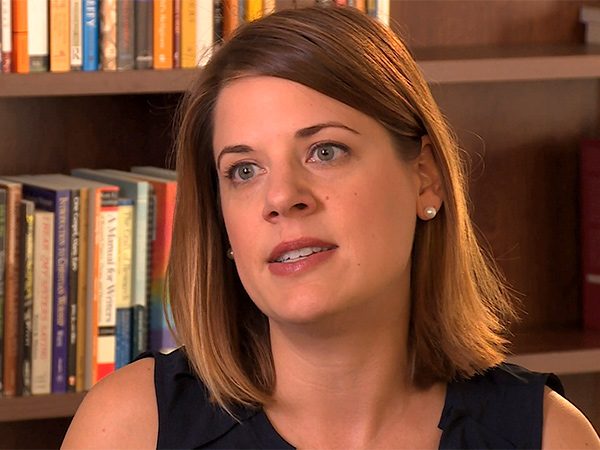 REV. CAROLYN DAVIS, Wesley Theological Seminary: When we vote, we always vote for a less than perfect option.
REV. CAROLYN DAVIS, Wesley Theological Seminary: When we vote, we always vote for a less than perfect option.
PECKNOLD: Certainly one is free to say look, there are no good choices here in this particular race. We think about voting as not the lesser of two evils, but who advances the good the best and does the least harm.
LAWTON: Stephen Schneck of Catholic University says Pope Francis has urged people to vote their consciences through a “citizenship of prudence.”
SCHNECK: We need to carefully think and sift and make our choices, not expecting that we’re going to solve once and forever the problem of sin in the world, but make what progress we can in what incremental ways that are available to us.
LAWTON: Rabbi Moline, who is president of Interfaith Alliance, agrees that even if people are unhappy with their choices, they have a moral obligation to vote their values.
MOLINE: When you walk into the voting booth, I’ve compared it to the holy of holies in the ancient temple. A curtain is closed behind you. You are alone with your God and your vote. People will cast their votes listening to their hearts. When they come out of the voting booth, they have to return to listening to each other.
DAVIS: Voting is the way we begin to fulfill our social obligation to one another, to hold one another in care. And that’s something that is common to many of our religious traditions. I would argue all.
BISHOP MICHAEL CURRY, The Episcopal Church USA: So I encourage you to please go and vote. Vote your conscience, vote your perspective, but vote.
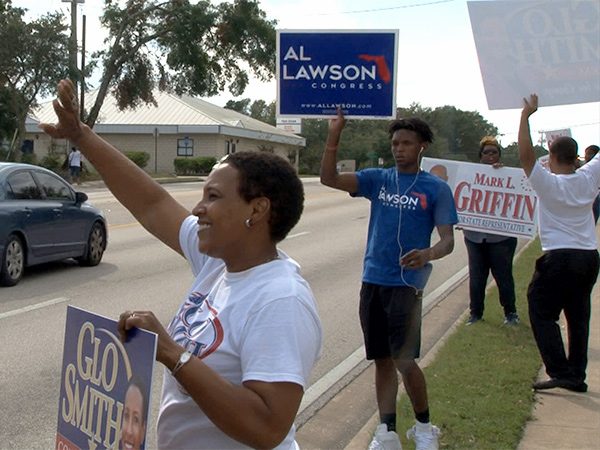 LAWTON: Indeed, many faith traditions are encouraging their members to vote. In several areas, churches have been sponsoring Souls to the Polls projects, where congregants are bused to polling places after services for early voting.
LAWTON: Indeed, many faith traditions are encouraging their members to vote. In several areas, churches have been sponsoring Souls to the Polls projects, where congregants are bused to polling places after services for early voting.
UNIDENTIFIED SPEAKER: Make sure that whatever you need in life is covered by the person that you’re voting for.
LAWTON: Davis says it’s good to remember that voting is not just a privilege, but a hard-fought-for right.
DAVIS: Not too long ago, African Americans from across the South got together and marched across a bridge, facing beatings, dogs, hoses, because there was something critical about being able to go to the polls to vote for leaders that represented them.
LAWTON: Many religious groups are also urging a time of prayer for the nation prior to the election. In Washington, several spiritual traditions held a Chant4Change gathering.
ANUTTAMA DASA, International Society for Krishna Consciousness: The political leaders ultimately are only a reflection of the people, and with all the tension and nastiness that’s going on, I think if the American people didn’t like it, then that would stop. So I think this group, they’re all saying, hey let’s change the tenor of the conversation, and it needs to start with us.
LAWTON: Beyond the election, Moline says the faith community will also have an obligation to help the nation to heal.
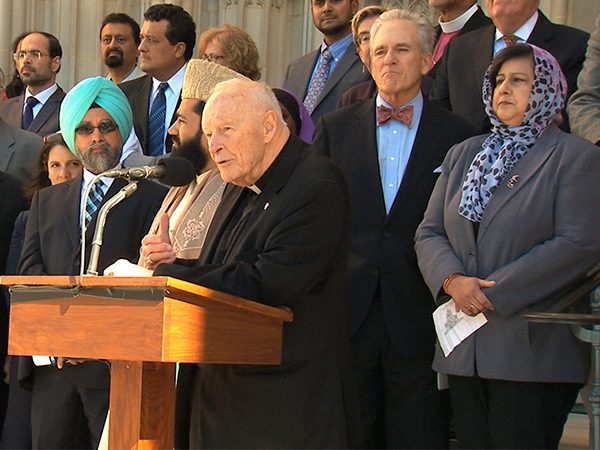 MOLINE: There have certainly been enough religious communities that have promoted the divisive issues in this campaign. Now it’s time to think about what our responsibilities to our real values and our real faith are.
MOLINE: There have certainly been enough religious communities that have promoted the divisive issues in this campaign. Now it’s time to think about what our responsibilities to our real values and our real faith are.
LAWTON: Chief among those responsibilities, he says, will be rebuilding relationships and rebuilding trust. Trust in one another and trust in our system of government.
MOLINE: There is an old Hasidic saying that people like to sing: the world is a narrow bridge but the important thing is not to be afraid. We all know that we are on tenuous ground wherever we are in this world with all the issues that face us, and there are a lot of things to be afraid of. But the essence is not to be afraid, to walk with other people across that narrow bridge, to get to the other side, whatever the promise is of what’s on the other side.
LAWTON: I’m Kim Lawton in Washington.

 MAN #1: The presidential election? I probably won’t choose anybody.
MAN #1: The presidential election? I probably won’t choose anybody. LAWTON: Greg Smith is associate director of research at the Pew Research Center, which has been polling voters throughout the pre-election season.
LAWTON: Greg Smith is associate director of research at the Pew Research Center, which has been polling voters throughout the pre-election season. LAWTON: The negativity among voters often takes on a moral dimension. Many people of faith are among those raising concerns about the rhetoric that has dominated the campaign.
LAWTON: The negativity among voters often takes on a moral dimension. Many people of faith are among those raising concerns about the rhetoric that has dominated the campaign. LAWTON: Some voters question whether they can in good conscience vote for either candidate. Chad Pecknold is professor of systematic theology at Catholic University of America. A pro-life Catholic, Pecknold tends to be politically conservative. This year, he says, he’s very conflicted.
LAWTON: Some voters question whether they can in good conscience vote for either candidate. Chad Pecknold is professor of systematic theology at Catholic University of America. A pro-life Catholic, Pecknold tends to be politically conservative. This year, he says, he’s very conflicted. REV. CAROLYN DAVIS, Wesley Theological Seminary: When we vote, we always vote for a less than perfect option.
REV. CAROLYN DAVIS, Wesley Theological Seminary: When we vote, we always vote for a less than perfect option. LAWTON: Indeed, many faith traditions are encouraging their members to vote. In several areas, churches have been sponsoring Souls to the Polls projects, where congregants are bused to polling places after services for early voting.
LAWTON: Indeed, many faith traditions are encouraging their members to vote. In several areas, churches have been sponsoring Souls to the Polls projects, where congregants are bused to polling places after services for early voting. MOLINE: There have certainly been enough religious communities that have promoted the divisive issues in this campaign. Now it’s time to think about what our responsibilities to our real values and our real faith are.
MOLINE: There have certainly been enough religious communities that have promoted the divisive issues in this campaign. Now it’s time to think about what our responsibilities to our real values and our real faith are.




